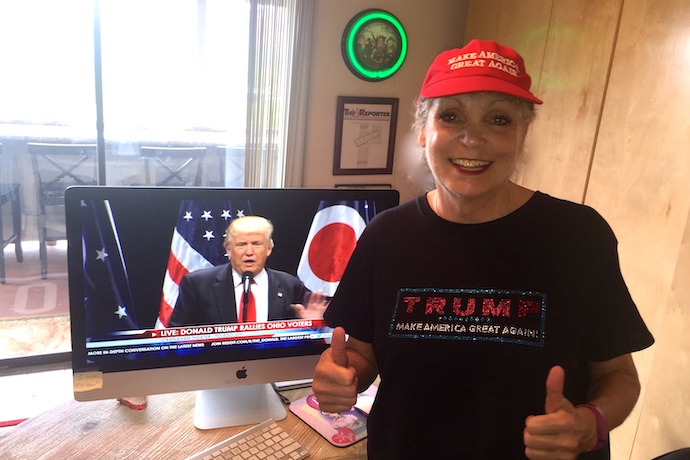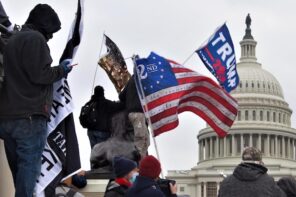On Wednesday, January 6, a day now infamous for many Americans, I was pulled from my daily work tasks by a colleague’s text urging me to turn on the television and stop all work. We all know what happened that day. But as I watched the storming of the capital—replete with white supremacy symbols, Christian symbols, Trump iconography, and images of weapons—I had an overwhelming sense, not of shock, but of inevitability. Nothing I was seeing reflected anything different from what I’d seen over and over the past four years. White people with weapons. Angry white people with weapons. Violent intimidation and entitlement to space. Religious devotion to a president who lies, steals, and terrorizes on behalf of his supporters, who in turn lie, steal, and terrorize (or avert their gaze while others do). It’s not shocking, but it is dangerous.
I shudder to think about what would have happened if, instead of storming the Capitol, there had been nearby citizens that the mob turned its attention to. We don’t have to do too much imagining. At the same time the events in the Capitol were unfolding, a pro-Trump mob in Los Angeles surrounded and assaulted Berlinda Nibo, a 25-year-old Black woman, while police (predictably) stood by and did nothing.
In the wake of January 6, religious and political leaders have started to distance themselves from Trumpism. Texas pastor Robert Jeffress, President Trump’s most voracious evangelical supporter, wrote an op-ed saying “The events that unfolded in the Capitol on Wednesday were unprecedented, as well as despicable and wrong.” Pastor Jack Graham of mega-church Prestonwood, also in Texas, tweeted on Jan 6: “Violence at our nation’s capital is to be condemned and law and order must prevail. Pray for our country. This is heartbreaking.” California mega-church pastor Rick Warren stated things in starker terms: “Armed breaching of capitol security behind a confederate flag is anarchy, unAmerican, criminal treason and domestic terrorism. President Trump must clearly tell his supporters ‘We lost. Go home now.’”
https://twitter.com/RickWarren/status/1346917979200475142
As a scholar of religion, social justice advocate, and white Christian myself, these statements have felt like salt on a wound. Confirmation, yet again, that Black lives don’t really matter, women’s lives don’t really matter, immigrant and Brown lives don’t really matter, LGBTQ+ lives don’t really matter. Because though our individual and collective lives have been under daily siege by Trumpism, this has not merited the same public outrage, theological introspection, or political condemnation.
Indeed, when one reads between the lines of some recent “reckonings” with Trumpism by evangelical leaders or distancing from Trump as a leader, it’s clear, too, that the majority of this distancing is not a distancing from the white supremacy, patriarchy, or misogyny at the heart of Trumpism or a call to reckon with and break from practices of oppression. Rather, what’s being objected to is the dramatically un-respectable way that these impulses were channeled on Jan 6, because “good” white Americans and “good” white Christians need to be able to clothe their white supremacy, patriarchy, and misogyny with piety, proceduralism, and a belief in their own goodness. The fiction of democracy and benevolent capitalism is needed in order to be able to sleep at night and worship on Sunday morning. Unfortunately, the storming of the Capitol made these “white lies,” at least for a brief moment, untenable.
This could be a moment of awakening. To use a different metaphor, the events on January 6 could be a significant glitch in our operating system that exposes the viruses of racism, xenophobia, and misogyny that have been operating in the background of our democracy since its founding. Listing the racism, nationalism, sexism, and misogyny reflective of Trumpism, evangelical writer Ed Stetzer reflected last week: “As evangelicals, we have to stop saying this isn’t who we are. This is who we are; these are our besetting sins.”
And a statement by Wheaton college faculty and staff goes further than other evangelical responses to acknowledge that “the differential treatment displayed by those with a duty to protect in their engagement with rioters who trespassed on the Capitol grounds illegally, when compared to recent protests over police brutality in D.C. last summer, illustrates the ongoing reality that systemic racism in our country is tragically and undeniably alive and well. These realities are reprehensible.” But such explicit evangelical acknowledgment of the “sins” of Trumpism remains rare. And it’s also clear that the system is going to fight like hell to return to normal as quickly as possible. So I’m not holding my breath for significant change, despite rising calls for leadership and media accountability.
We must ask ourselves, why do the events at the Capitol reflect a seeming turning point in white consciousness, a moment of rupture that led to more vocal criticism of Trump from the religious and political right than we’ve seen at any point in his presidency? I would argue that the differential response is because the mob’s target was, quite literally, the very symbols necessary to sustain a collective white mythology of exceptionalism, superiority, and goodness (we’re not like those other countries where they stage violent coups or subvert/manipulate elections, we have democracy, we are a ‘shining light’…). And this fiction is essential for everyday white people to both sustain and conceal the destruction unleashed on Black lives, indigenous lives, immigrant lives, LGBTQ+ lives, non-Christian lives, and the planet every single day.
The events at the Capitol laid bare—in prime time—the terror and violence at the heart of whiteness, but again, it’s not an aberration from the established patterns of violence we’ve seen over the past four years. In actuality, white violence is centuries old. Make no mistake, what many Americans think of as democracy was born from white violence, nourished by ongoing practices of enslavement, disenfranchisement, and systemic control of Black people, Indigenous people, and other people of color. And these practices were supported by those who considered themselves to be good white Christians. Yet, we also depend on various institutions to whitewash this reality, to conceal the truth from us—even institutions like Congress.
What the events on the Capitol confirmed to me, then, was what so many of us already knew: that white people in the US have long been willing to have blood on their hands, to shed blood, if it means advancing their privilege, comfort, and security. In the wake of Jan 6, we now also have more visual evidence documenting white willingness to create wide-scale destruction and to undermine basic social functioning for the sake of protecting white supremacy. We are confronted yet again by the sanctity afforded white lives (even when engaging in violent and criminal activity) by the state, in comparison to the treatment of Black lives, which are seen as expendable at any moment.
In 1977, Black South African theologian Allan Boesak wrote, “in order to maintain the status quo, it is necessary for whites to believe and keep on believing, that they are innocent.” Until white Christians are willing to jettison the lie of their own goodness and confront the racism, misogyny and violence at the heart of whiteness—to say, as Boesak writes, farewell to innocence—then I have no reason to believe the willingness of many to bless, pray for, and otherwise theologically sanction political leaders who lie, steal, and murder on their behalf will cease.
And until we’re willing to face directly the lived impact of white supremacy, patriarchy, and capitalism, we will continue to see religious support of violence and terror, domestically and internationally. And those most impacted by this violence and terror will remain unsafe. However, we will continue to struggle for human rights, dignity, true democracy, and justice. What choice is there, in the face of death, but to assert life and existence, over and over again? The choice for many white Christians, though, is whether they will continue to participate in a white supremacist death cult. We are watching.





